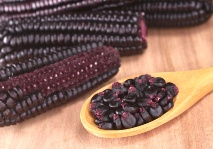 You might not have heard of this particular food cure. A cousin to blue corn is purple corn, grown mostly in Peru and Chile. In a brand new health breakthrough, scientists have found certain compounds in purple corn that could protect diabetics from serious complications.
You might not have heard of this particular food cure. A cousin to blue corn is purple corn, grown mostly in Peru and Chile. In a brand new health breakthrough, scientists have found certain compounds in purple corn that could protect diabetics from serious complications.
Diabetic nephropathy is kidney damage triggered by type 2 diabetes. It often leads to fatal kidney disease. Purple corn is rich in “anthocyanins,” natural plant chemicals believed to have diabetes-fighting abilities. In the new study out of Korea, researchers looked at purple corn anthocyanins to see if and how they could protect against kidney damage.
PLUS: Little-known Fruit Could Prevent Diabetes
They essentially found that purple corn anthocyanins works against several pathways that lead to diabetic nephropathy. This may be a promising finding for future therapies aimed at diabetes and kidney disease.
The study involved a laboratory test investigating purple corn anthocyanins on human kidney cells exposed to conditions imposed by diabetes. The second part looked at how these particular anthocyanins impacted kidney tissue in diabetic mice. The results are heavily technical, but we can sum by saying that, in both cases, the purple corn extract impacted the molecular ways in which kidney damage occurs. For instance, in one case, it helped stop the process of inflammation that is linked to the kidneys.
The researchers go on to suggest that supplements of purple corn anthocyanins could be an important strategy in preventing kidney disease among type 2 diabetics.
Anthocyanins are a type of flavonoid. In nature, they are pigments that give red, purple, and blue colors to a variety of vegetables, fruit, whole grains, and flowers. When you consume foods like blueberries, cherries, beets, purple cabbage, purple grapes, and raspberries, you are getting heaps of these antioxidant, anti-inflammatory anthocyanins.
They have shown the ability to prevent a long list of diseases, but remain very tricky to study directly. From the study here, it shows that diabetics might do very well to eat foods of these colors to help protect their kidneys.
